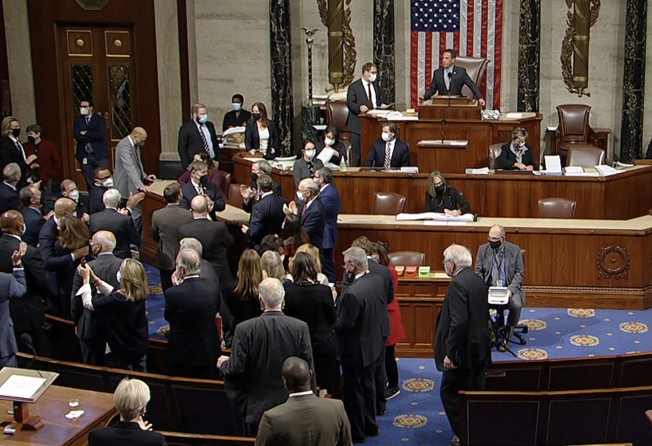
How Joe Biden’s midterm election performance could affect the US stock market
- Losing control of the House or Senate would make it harder for Biden to pass his agenda of reform on taxes, energy and welfare
- Policies can still be pushed through via executive order although this would add to uncertainty for investors and businesses

It has been a year since the US presidential election and we are one year away from the midterm elections. Many had hoped that Joe Biden’s victory would restore some political normality to both the United States and the rest of the world. This has happened to some extent.
However, recent data and events show that US voters remain divided, and it is increasingly likely that Biden’s legislative agenda could come to a standstill in the second half of his term.
The midterm elections will be held on November 8 next year. All 435 seats in the House of Representatives and 34 of the 100 Senate seats are up for grabs.
The Democratic Party may have a majority in both chambers, but it is very thin. Democrats hold 221 seats to the Republican Party’s 213 in the House. The Senate is split 50-50 and Vice-President Kamala Harris casts the tiebreaker vote.
Midterm elections have never been kind to the incumbent party. Since 1942, the party in office has lost midterm seats in the House in 18 out of 20 elections, including double-digit losses on 15 occasions. The results are similar for the Senate, where seats were lost in 14 of 20 midterm votes.

This suggests Biden and the Democratic Party are facing an uphill battle, made more challenging by recent events. Biden’s approval rating declined after the post-inauguration honeymoon period – normal for any president in recent history.
But at 42 per cent, according to a Gallup poll taken last month, the rating takes his average for the first nine months to the second lowest among America’s last eight presidents (ahead only of Donald Trump). Covid-19, inflation and the US withdrawal from Afghanistan may have all played a role in the decline in support.
Highly divisive public opinion could also have contributed. This is not limited to Republican vs Democrat supporters. The prolonged negotiation of the US$1.2 trillion bipartisan infrastructure bill and the US$3.5 trillion Build Back Better budget resolution reflects the difference in opinion and ideology even within the Democratic Party.
The infrastructure bill was passed with support from a number of Republicans, but they do not support the Build Back Better plan. This plan, which is likely to be significantly reduced, represents Democrat progressives’ wish list in providing better child care, health care, tax credit for low-income families and education.
This spending would have been funded by higher taxes from large companies and the wealthy. Given the lack of Republican support on this spending plan, Biden needs all 50 votes in the Senate.
Yet two moderate Democrat senators, Joe Manchin and Kyrsten Sinema, withheld their support on concerns that the spending is too high. This stalemate is also weighing on public support for the party.
A year is a long time in politics and a lot can still change. The Democrats need to stage a spectacular comeback to regain public support and maintain control of both the House and Senate.
If they fails to do so, Biden may find considerable resistance to legislative plans, including in areas such as raising taxes to pay for government programmes, developing renewable energy and electric vehicles, and social welfare reform.
Even though some policies could be pushed through via executive order, businesses may not have the confidence to add investment if the orders could be overturned. Investors may welcome the reduced risk of higher taxes, but worry about the uncertainties facing decarbonisation.
The outcome of next year’s vote will have a limited impact in two areas, where the differences between the two sides are smaller. First is US-China relations. Both parties see the need for the US to do more to counter China’s competitive threat in economic, national security and geopolitical terms.
Biden is expected to stay tough on China, but keep dialogue open, such as on climate change and bilateral trade relations. This was largely the tone of his call with President Xi Jinping on November 15.
The second area is big tech regulation. Both parties have been critical of tech businesses, especially social media companies, albeit for different reasons. There could be more calls for regulations, or at least more scrutiny on issues such as monopolistic behaviour, insufficient protection of customer data, or managing content.
So there is no “one size fits all” answer to how the US midterm elections could affect the stock market. Investors will have to analyse the fundamentals of individual sectors and companies, and take account of the prevailing political climate in the US.
Tai Hui is chief market strategist for the Asia-Pacific at JP Morgan Asset Management

